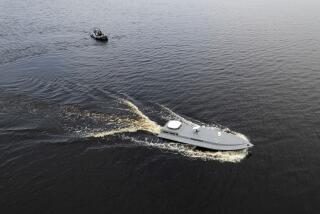Obituaries : Adm. Sergei Gorshkov; Called Driving Force of Soviet Navy
- Share via
MOSCOW — Adm. Sergei Gorshkov, who transformed the Soviet Union into a global sea power during 29 years as navy chief, died Friday at the age of 78, the Soviet news agency Tass said over the weekend.
Gorshkov, who retired in 1985 and was replaced by Vladimir N. Chernavin, died after a “severe and prolonged illness,” Tass said. It did not specify the cause of death.
In his years as naval commander, Gorshkov “showed a talent for organization and deep knowledge of the naval science,” Tass said, quoting an obituary signed by the Central Committee of the Communist Party, the Presidium of the Supreme Soviet and the Soviet Council of Ministers.
“Gorshkov had a feeling for the new and showed creative approaches in his work, and in a combat situation he displayed courage, will and fortitude,” it said.
It credited Gorshkov with making a “big contribution to the development of the Soviet navy.”
One Western expert said he had done more for the Russian navy than anyone since it was launched by the 17th-Century czar Peter the Great.
Gorshkov’s vision and energetic lobbying under five Soviet leaders is believed to have been the driving force behind the Kremlin’s decision to build up a fleet of submarines and surface ships equal to or surpassing in power the U.S. fleet.
Took Command at 45
When Gorshkov took command of the navy at the age of 45 in 1956, the fleet was little more than a collection of small coastal craft and river vessels that rarely strayed far from base.
Now Soviet vessels patrol the world’s oceans from Pacific, Baltic, Northern and Black Sea bases as well as installations in allied states. Nuclear missile submarines form the second most important strategic arm of the Soviet armed forces.
A prolific writer, Gorshkov tirelessly argued that a powerful fleet plays a unique role as an instrument of political influence in peacetime.
His thinking is also behind the development of the Soviet Union’s big merchant marine and fishing fleets, which Western experts say play a role as auxiliary to the military.
Gorshkov, who also served as a deputy defense minister during his years as navy commander, continued to work in a post of responsibility at the ministry until his death, Tass said.
Sergei Georgiyevich Gorshkov attended the Voroshilov Naval Academy in the 1930s, a period when the top ranks of the military were being decimated by the purges of Josef Stalin.
He distinguished himself as a commander of river flotillas and on the Black Sea in World War II and rose to the rank of rear admiral.
Elevated by Khrushchev
The admiral was named head of the Soviet navy by Nikita S. Khrushchev, who considered Stalin’s emphasis on large surface vessels to be impractical because of their vulnerability to rocket attack.
In a book titled “Sea Power of the State,” Gorshkov said the Soviet navy’s development of a fleet of submarines and missile-launching warships had frustrated “illusory hopes of imperialist aggressors that in the sphere of armed conflict at sea they would have no strong opponent.”
More to Read
Sign up for Essential California
The most important California stories and recommendations in your inbox every morning.
You may occasionally receive promotional content from the Los Angeles Times.












